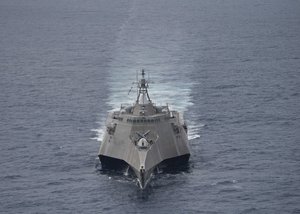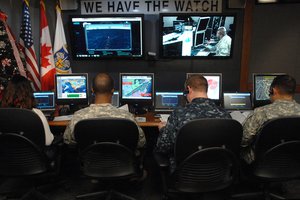- published: 18 Apr 2014
- views: 7858
-
remove the playlistModal Logic
- remove the playlistModal Logic
- published: 21 Jan 2013
- views: 12069
- published: 25 Mar 2015
- views: 2311
- published: 23 Jan 2013
- views: 9910
- published: 22 Feb 2013
- views: 2459
- published: 25 Jan 2013
- views: 6841
- published: 17 Oct 2014
- views: 21346
- published: 06 Mar 2016
- views: 688
Modal logic
Modal logic is a type of formal logic primarily developed in the 1960s that extends classical propositional and predicate logic to include operators expressing modality. Modals—words that express modalities—qualify a statement. For example, the statement "John is happy" might be qualified by saying that John is usually happy, in which case the term "usually" is functioning as a modal. The traditional alethic modalities, or modalities of truth, include possibility ("Possibly, p", "It is possible that p"), necessity ("Necessarily, p", "It is necessary that p"), and impossibility ("Impossibly, p", "It is impossible that p"). Other modalities that have been formalized in modal logic include temporal modalities, or modalities of time (notably, "It was the case that p", "It has always been that p", "It will be that p", "It will always be that p"),deontic modalities (notably, "It is obligatory that p", and "It is permissible that p"), epistemic modalities, or modalities of knowledge ("It is known that p") and doxastic modalities, or modalities of belief ("It is believed that p").
This article is licensed under the Creative Commons Attribution-ShareAlike 3.0 Unported License, which means that you can copy and modify it as long as the entire work (including additions) remains under this license.
- Loading...

-
 27:18
27:18Modal Logic (Basics)
Modal Logic (Basics)Modal Logic (Basics)
A explanation of the basics of Modal Logic, including the difference between the K, T, B, S4 and S5 systems of modal logic (100 Days of Logic). -
 11:25
11:25Modal logic 0.1 - basic introduction
Modal logic 0.1 - basic introductionModal logic 0.1 - basic introduction
A brief, intuitive introduction to the basic concepts of modal logic. The box & diamond operators, necessity & possibility, possible worlds, etc. If you're already familiar with all this stuff, you can skip this video. Part 2: http://www.youtube.com/watch?v=0djILNja3ZE -
 6:59
6:591. Logic Lecture: Introduction to Modal Logic
1. Logic Lecture: Introduction to Modal Logic -
 47:59
47:59Max Cresswell lecture: "Arthur Prior - The History of Temporal and Modal Logic …"
Max Cresswell lecture: "Arthur Prior - The History of Temporal and Modal Logic …"Max Cresswell lecture: "Arthur Prior - The History of Temporal and Modal Logic …"
Max Cresswell lecture: "Arthur Prior - The History of Temporal and Modal Logic in the 1950s as seen from a Philosophical Perspective", Aalborg University, Denmark, May 16, 2008. -
 16:25
16:25Modal logic 1.1 - system K - introduction
Modal logic 1.1 - system K - introductionModal logic 1.1 - system K - introduction
An introduction to the basic concepts of the system K in modal logic. -
 13:11
13:11Quine's objections to modal logic 1 - historical background
Quine's objections to modal logic 1 - historical backgroundQuine's objections to modal logic 1 - historical background
I briefly discuss the development of modern modal logic, to set the scene for Quine's attack. -
 13:03
13:03A Quick Introduction to Modal Logic, part 1
A Quick Introduction to Modal Logic, part 1A Quick Introduction to Modal Logic, part 1
An introduction to modal logic for my PHIL478P course. -
 16:12
16:12Modal logic 1.2 - truth trees for system K
Modal logic 1.2 - truth trees for system KModal logic 1.2 - truth trees for system K
The rules for truth trees in system K, and some advice about constructing trees in K. I then use trees to prove the validity of two simple arguments. -
 9:21
9:21Are Possible Worlds Real? Modal Realism Part 1 – Philosophy Tube
Are Possible Worlds Real? Modal Realism Part 1 – Philosophy TubeAre Possible Worlds Real? Modal Realism Part 1 – Philosophy Tube
What are possible worlds? What does it mean to say something might have been true? Watch Part 1 of our discussion on David Lewis’ modal realism to find out! Part 2! http://tinyurl.com/pdxgkjt Metaphysics playlist: https://www.youtube.com/playlist?list=PLvoAL-KSZ32cX32PRBl1D4b4wr8DwhRQ4 Subscribe! http://tinyurl.com/pr99a46 Patreon: http://www.patreon.com/PhilosophyTube Facebook: https://www.facebook.com/PhilosophyTube Twitter: @PhilosophyTube Email: ollysphilosophychannel@gmail.com Google+: google.com/+thephilosophytube Suggested Reading: David Lewis, On The Plurality of Worlds Sponsors! Juho Laitalainen Eric Driussi Ethan Arnold Rich Clarke Total Philosophy Looking Glass Universe D.j. The University of St Andrews If you or your organisation would like to financially support Philosophy Tube in distributing philosophical knowledge to those who might not otherwise have access to it in exchange for credits on the show, please find me on Patreon or get in touch by email! Music: 'Show your Moves' and 'Pamgea' by Kevin MacLeod (incompetech.com) Any copyrighted material should fall under fair use for educational purposes or commentary, but if you are a copyright holder and believe your material has been used unfairly please get in touch with us and we will be happy to discuss it. -
 58:16
58:1610 Perplexing Puzzle for the Master Modal Logician
10 Perplexing Puzzle for the Master Modal Logician10 Perplexing Puzzle for the Master Modal Logician
10 Modal Logic Puzzles for you to test your modal logic skills with. Including proofs of the various iterations of Axiom K, and the consequences of the Necessitation Rule and Axiom K (distributing and exporting necessity and possibility across implication, conjunction and disjunction).
-

Modal Logic (Basics)
A explanation of the basics of Modal Logic, including the difference between the K, T, B, S4 and S5 systems of modal logic (100 Days of Logic).
published: 18 Apr 2014 -

Modal logic 0.1 - basic introduction
A brief, intuitive introduction to the basic concepts of modal logic. The box & diamond operators, necessity & possibility, possible worlds, etc. If you're already familiar with all this stuff, you can skip this video. Part 2: http://www.youtube.com/watch?v=0djILNja3ZE
published: 21 Jan 2013 -

-

Max Cresswell lecture: "Arthur Prior - The History of Temporal and Modal Logic …"
Max Cresswell lecture: "Arthur Prior - The History of Temporal and Modal Logic in the 1950s as seen from a Philosophical Perspective", Aalborg University, Denmark, May 16, 2008.
published: 25 Mar 2015 -

Modal logic 1.1 - system K - introduction
An introduction to the basic concepts of the system K in modal logic.
published: 23 Jan 2013 -

Quine's objections to modal logic 1 - historical background
I briefly discuss the development of modern modal logic, to set the scene for Quine's attack.
published: 22 Feb 2013 -

A Quick Introduction to Modal Logic, part 1
An introduction to modal logic for my PHIL478P course.
published: 29 Aug 2013 -

Modal logic 1.2 - truth trees for system K
The rules for truth trees in system K, and some advice about constructing trees in K. I then use trees to prove the validity of two simple arguments.
published: 25 Jan 2013 -

Are Possible Worlds Real? Modal Realism Part 1 – Philosophy Tube
What are possible worlds? What does it mean to say something might have been true? Watch Part 1 of our discussion on David Lewis’ modal realism to find out! Part 2! http://tinyurl.com/pdxgkjt Metaphysics playlist: https://www.youtube.com/playlist?list=PLvoAL-KSZ32cX32PRBl1D4b4wr8DwhRQ4 Subscribe! http://tinyurl.com/pr99a46 Patreon: http://www.patreon.com/PhilosophyTube Facebook: https://www.facebook.com/PhilosophyTube Twitter: @PhilosophyTube Email: ollysphilosophychannel@gmail.com Google+: google.com/+thephilosophytube Suggested Reading: David Lewis, On The Plurality of Worlds Sponsors! Juho Laitalainen Eric Driussi Ethan Arnold Rich Clarke Total Philosophy Looking Glass Universe D.j. The University of St Andrews If you or your organisation would like to financially support Phil...
published: 17 Oct 2014 -

10 Perplexing Puzzle for the Master Modal Logician
10 Modal Logic Puzzles for you to test your modal logic skills with. Including proofs of the various iterations of Axiom K, and the consequences of the Necessitation Rule and Axiom K (distributing and exporting necessity and possibility across implication, conjunction and disjunction).
published: 06 Mar 2016
Modal Logic (Basics)
- Order: Reorder
- Duration: 27:18
- Updated: 18 Apr 2014
- views: 7858
- published: 18 Apr 2014
- views: 7858
Modal logic 0.1 - basic introduction
- Order: Reorder
- Duration: 11:25
- Updated: 21 Jan 2013
- views: 12069
- published: 21 Jan 2013
- views: 12069
1. Logic Lecture: Introduction to Modal Logic
- Order: Reorder
- Duration: 6:59
- Updated: 07 Jun 2010
- views: 15239
Max Cresswell lecture: "Arthur Prior - The History of Temporal and Modal Logic …"
- Order: Reorder
- Duration: 47:59
- Updated: 25 Mar 2015
- views: 2311
- published: 25 Mar 2015
- views: 2311
Modal logic 1.1 - system K - introduction
- Order: Reorder
- Duration: 16:25
- Updated: 23 Jan 2013
- views: 9910
- published: 23 Jan 2013
- views: 9910
Quine's objections to modal logic 1 - historical background
- Order: Reorder
- Duration: 13:11
- Updated: 22 Feb 2013
- views: 2459
- published: 22 Feb 2013
- views: 2459
A Quick Introduction to Modal Logic, part 1
- Order: Reorder
- Duration: 13:03
- Updated: 29 Aug 2013
- views: 2499
- published: 29 Aug 2013
- views: 2499
Modal logic 1.2 - truth trees for system K
- Order: Reorder
- Duration: 16:12
- Updated: 25 Jan 2013
- views: 6841
- published: 25 Jan 2013
- views: 6841
Are Possible Worlds Real? Modal Realism Part 1 – Philosophy Tube
- Order: Reorder
- Duration: 9:21
- Updated: 17 Oct 2014
- views: 21346
- published: 17 Oct 2014
- views: 21346
10 Perplexing Puzzle for the Master Modal Logician
- Order: Reorder
- Duration: 58:16
- Updated: 06 Mar 2016
- views: 688
- published: 06 Mar 2016
- views: 688

- Playlist
- Chat

- Playlist
- Chat

Modal Logic (Basics)
- Report rights infringement
- published: 18 Apr 2014
- views: 7858

Modal logic 0.1 - basic introduction
- Report rights infringement
- published: 21 Jan 2013
- views: 12069

1. Logic Lecture: Introduction to Modal Logic
- Report rights infringement
- published: 07 Jun 2010
- views: 15239

Max Cresswell lecture: "Arthur Prior - The History of Temporal and Modal Logic …"
- Report rights infringement
- published: 25 Mar 2015
- views: 2311

Modal logic 1.1 - system K - introduction
- Report rights infringement
- published: 23 Jan 2013
- views: 9910

Quine's objections to modal logic 1 - historical background
- Report rights infringement
- published: 22 Feb 2013
- views: 2459

A Quick Introduction to Modal Logic, part 1
- Report rights infringement
- published: 29 Aug 2013
- views: 2499

Modal logic 1.2 - truth trees for system K
- Report rights infringement
- published: 25 Jan 2013
- views: 6841

Are Possible Worlds Real? Modal Realism Part 1 – Philosophy Tube
- Report rights infringement
- published: 17 Oct 2014
- views: 21346

10 Perplexing Puzzle for the Master Modal Logician
- Report rights infringement
- published: 06 Mar 2016
- views: 688
US warns Beijing on South China Sea islands
Edit BBC News 03 Jun 2017North Korea a 'clear and present' threat, says US defence secretary
Edit The Guardian 03 Jun 2017Ariana Grande visits injured fans at Manchester hospital
Edit CNN 03 Jun 2017Here are the areas in the US most likely to be struck in a nuclear attack by Russia
Edit The Independent 02 Jun 2017Trump Will Consider Blocking Comey Testimony Using Executive Privilege
Edit WorldNews.com 02 Jun 2017Farm loan waiver in Maharashtra to be ‘biggest-ever’, says CM Fadnavis
Edit India TV 03 Jun 2017Farm loan waiver in Maha to be "biggest-ever": Fadnavis
Edit DNA India 03 Jun 2017Najib Balala looking at African markets to expand tourism sector
Edit Coastweek 03 Jun 201797pc of transport budget goes to Orange Train
Edit The News International 03 Jun 201797pc of transport budget goes to Orange Train project
Edit The News International 03 Jun 2017Paris Agreement: Formal US exit possible only in 2020
Edit The Times of India 03 Jun 2017Kathy Griffin learned a hard lesson in weaponized outrage
Edit Hot Air 03 Jun 2017How to Not Cure Your Panic Attacks
Edit Vice 02 Jun 2017Jal Marg Vikas Project gets a push from Yodi Aditynath ahead of the 2019 polls
Edit Yahoo Daily News 02 Jun 2017Paris climate pact can't be renegotiated: UNFCCC
Edit Yahoo Daily News 02 Jun 2017Kenya eyes African market to expand tourism sector
Edit Xinhua 02 Jun 2017Paris Agreement cannot be renegotiated on request of a single
Edit DNA India 02 Jun 2017- 1
- 2
- 3
- 4
- 5
- Next page »






















